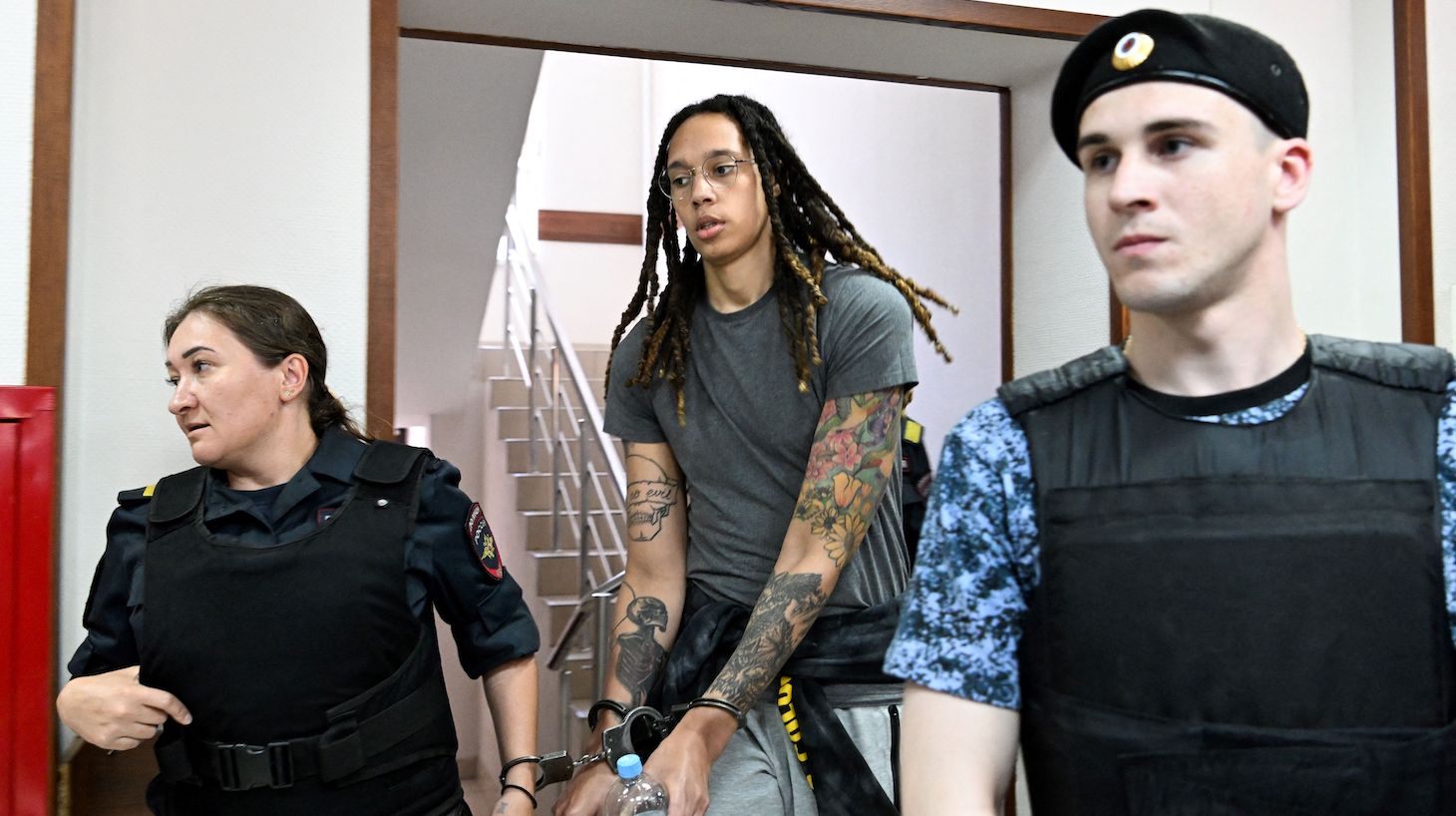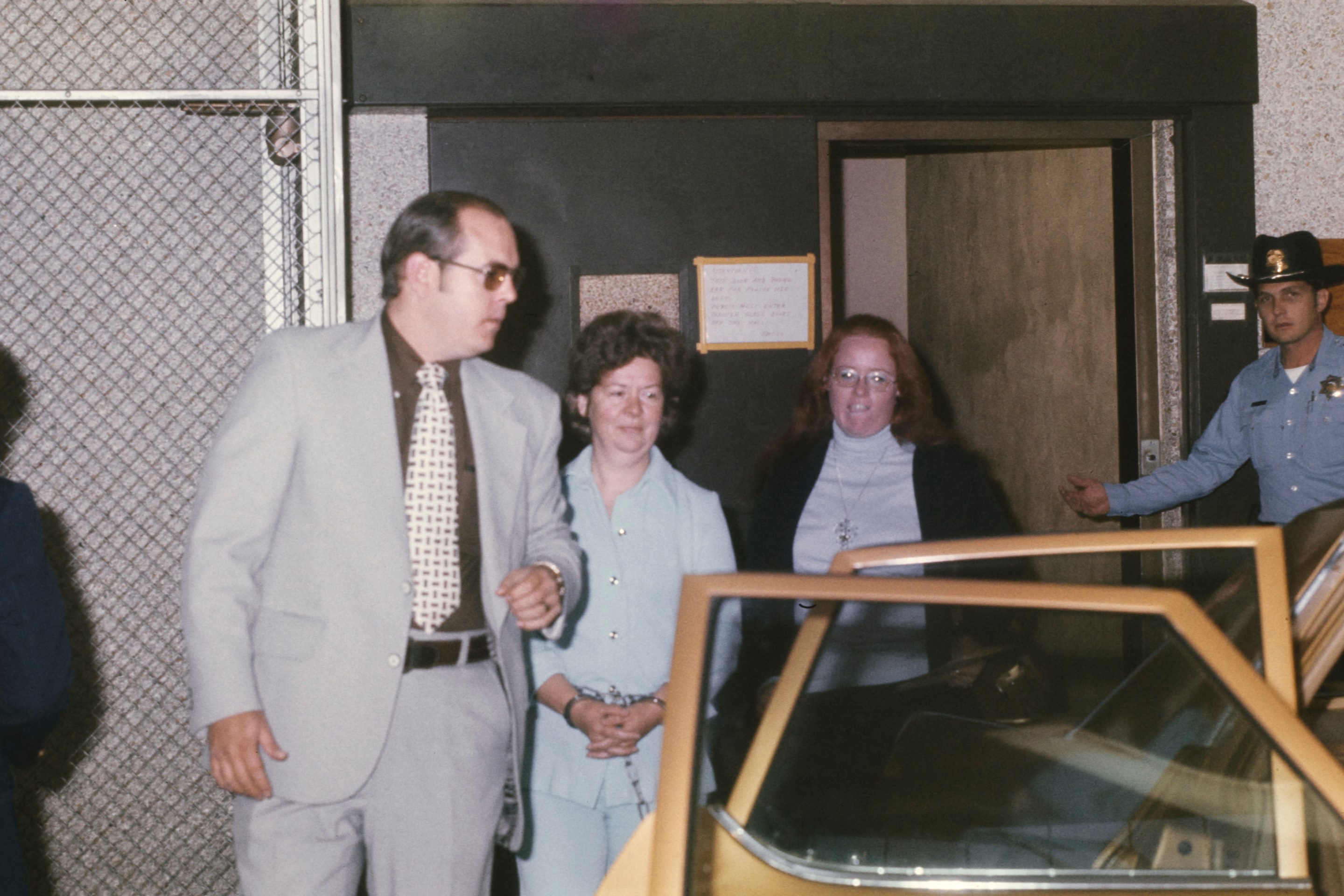WNBA star Brittney Griner will stand trial in Russia starting on Friday, her lawyer said Monday after Griner appeared in a Russian court for a preliminary hearing. The court said it was again extending Griner's detention for six months pending the result of the trial, which itself could take weeks if not months. There's almost no chance that Griner gets acquitted (the Associated Press reported that fewer than 1 percent of Russian criminal cases result in acquittals) and last month the U.S. State Department designated her as "wrongfully detained," signaling that it does not intend to wait for Russian legal proceedings to play out; instead it will negotiate to get her home. How will it do that? Those with expertise in dealing with the labyrinth of wrongful detainment agree that prisoner swaps are often the only, and certainly one of the fastest, ways to get a person released.
American basketball star #BrittneyGriner arrives to a Russian court outside Moscow. Today’s “preliminary hearing” should set the schedule for a trial on drug charges. The US considers Griner “wrongfully detained” and has assigned her case to its envoy for hostage affairs. pic.twitter.com/8yY9i09gsN
— Charles Maynes (@cwmiii3) June 27, 2022
Speaking to the Washington Post, for example, Brian Whitmore, a nonresident senior fellow at the Atlantic Council’s Eurasia Center and an assistant professor at the University of Texas Arlington, "characterized Griner’s detainment as 'a hostage situation' and her trial as an exercise in 'political theater' designed to pressure the U.S. government into a prisoner swap." Indeed, this is more or less routine in cases of wrongful detainment. In April, a Marine veteran named Trevor Reed, who was arrested in Russia in 2019 on charges of assaulting a police officer, was exchanged for a Russian pilot convicted of trafficking cocaine.
Russian and U.S. media have both reported the possibility that Griner could be swapped for a Russian arms trader named Viktor Bout. The Associated Press wrote:
Bout, nicknamed “The Merchant of Death,” [...] is serving a 25-year sentence on conviction of conspiracy to kill U.S. citizens and providing aid to a terrorist organization. Russia has agitated for Bout’s release for years. But the discrepancy between Griner’s case — she allegedly was found in possession of vape cartridges containing cannabis oil — and Bout’s global dealings in deadly weapons could make such a swap unpalatable to the U.S.
Whitmore agreed, telling the Post: "It’s clear the [Biden] administration is under increasing pressure from society, from Griner’s friends and family. It’s not an enviable position here, because it’s clear what the Russian government wants. This is akin to negotiating with a terrorist.”
"Merchant of Death" (a nickname, interestingly enough, coined in the 1930s to describe U.S. defense contractors) certainly sounds very bad, and it's true that having a few vape cartridges pales in comparison to selling weapons to bad guys. A slightly closer reading of how Bout operated and what exactly he's accused of, however, might improve the "palatability" of this prisoner swap.
For example, American news media has been repeating that Bout sold weapons to warlords and other terrorist groups. Of course, it's also worth recalling some of Bout's other loyal clients: the United States military. In his book on Bout, journalist Douglas Farah recounts how Bout supplied not only the Taliban, Liberia’s Charles Taylor, and Congolese warlords, but the U.S. Army and other defense contractors.
"The U.S. government response to revelations of the use of Viktor Bout to fly for government contractors in Iraq (not just a few flights, but hundreds, and perhaps a thousand) has been mixed," Farah told Mother Jones in an interview in 2007. He said:
Bear in mind most of these flights occurred after President Bush had signed an executive order making it illegal to do business with Bout, because he represented a security threat to the United States. The State Department, under a congressional inquiry initiated by Senator Russell Feingold, found it had used Bout companies, acknowledged it, and stopped. Paul Wolfowitz, while at DOD, did not respond to queries for nine months, then acknowledged that DOD contractors had subcontracted to Bout companies. Despite the public revelation, the congressional inquiry, the executive order, and a subsequent Treasury Department order freezing the assets of Bout and his closest associates, the flights continued for many months, at least until the end of 2005. The Air Force cut him off immediately, but other branches of the military continued to use him.
Douglas Farah
And this wasn't the only instance of the U.S. government engaging Bout, directly and repeatedly and in violation of the law, for assistance.
"Bout, through an intermediary, approached the CIA and FBI immediately after 9/11, and offered his services in helping to oust the Taliban if he were paid tens of millions of dollars for his efforts," Farah said. "Negotiations were serious and lasted several months, but we do not know what, if any, parts of the deal he offered were accepted."
The full interview, which describes Bout as "unique creature born of the end of Communism and the rise of unbridled capitalism when the Wall came down in the early 1990s" and who operated in a legal gray area, is worth a read. At the least, it complicates the popular narrative of Bout as an evil mastermind, painting him instead as a greedy opportunist who operated for many years under the tacit permission of the U.S. government.
Then there's also the matter of the specifics of Bout's actual conviction. Bout was arrested in Bangkok in 2008 after having agreed to sell arms to undercover American agents posing as members of the Revolutionary Armed Forces of Colombia (FARC), which the U.S. government—itself long engaged in destabilizing and violently overthrowing left-wing governments in Central and South America—had deemed a terrorist organization. A Russian citizen, arrested in Thailand, extradited to the U.S. and sent to prison for something he was attempting to do in Colombia, a country where U.S.-backed death squads wiped out "social workers, trade unionists, men and women who [were] not supportive of the establishment, and who [were] assumed to be communist extremists"? We can at least agree the United States' position a global moral arbiter is not tenable.
In the very first place, Griner never should have been in this situation, one that's even more fraught and complicated by Russia's invasion of Ukraine. But now the U.S. government has a choice: Get Brittney Griner home or hang onto an old guy and former U.S. Army business partner who hasn't been in the arms-selling game for a decade and half.
After Monday's hearing, a State Department spokesperson said, per the Post: “We have no higher priority than the safety and security of U.S. citizens overseas. The Department of State has determined that the Russian Federation has wrongfully detained U.S. citizen Brittney Griner. The U.S. government will continue to provide appropriate support to Ms. Griner and her family. We will continue to press for her release.”
But last week, Griner's wife Cherelle Griner told the Associated Press that she's losing faith in the government's dedication to helping her wife get free. Cherelle Griner said a long-scheduled call with her wife via the American embassy in Russia never happened because the embassy phone wasn't staffed.
“I find it unacceptable and I have zero trust in our government right now. If I can’t trust you to catch a Saturday call outside of business hours, how can I trust you to actually be negotiating on my wife’s behalf to come home? Because that’s a much bigger ask than to catch a Saturday call," she said.
Without a prisoner swap, Griner is almost certainly looking at many years in a Russian prison cell. Bout will be eligible for release in 2029.






